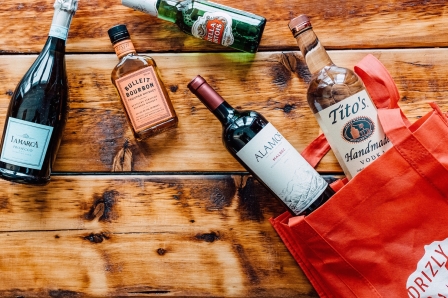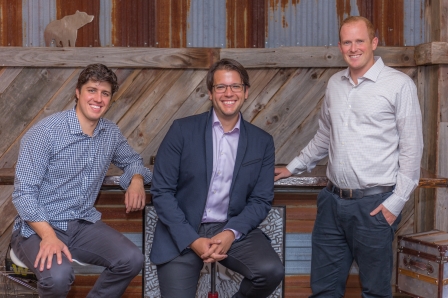Alcohol Delivery Firm Drizly Gulps $15M to Fend Off Amazon, Startups

In some ways, Drizly’s mobile app-enabled alcohol shopping service is so ’90s.
“It’s going to sound kind of boring … but what we’re doing is very tech 1.0,” says Nick Rellas, Drizly’s co-founder and CEO. “We’re bringing a world of over $ 100 billion a year [in alcohol sales] that is almost entirely physically based, onto the Internet.” Less than 2 percent of U.S. alcohol sales happen digitally, he says, and the overwhelming amount of that is wine shipped directly to consumers.
In other words, there’s a huge business opportunity here, and Drizly is far from the only company to spot it. There has been an explosion of software startups over the past few years that enable consumers to shop for beer, wine, and spirits online and have the items shipped to their doorstep in under an hour. Drizly’s competitors in this young (and already frothy) industry include Thirstie, Minibar Delivery, Swill, Saucey, and more.
As Drizly works to separate itself from the pack of on-demand alcohol delivery startups, it got a huge boost with today’s announcement that investors poured it another round. The $ 15 million Series B investment was led by Polaris Partners, with contributions from previous backers Fairhaven Capital and Suffolk Equity Partners. That brings Drizly’s total venture capital haul to $ 32.8 million since Rellas and Justin Robinson founded the Boston-based company in 2012.

From left, Drizly chief operating officer Cory Rellas; co-founder and CEO Nick Rellas; and co-founder Justin Robinson.
The investment comes at a critical juncture for Drizly and the budding sector. Rellas thinks it positions Drizly as the leading alcohol delivery startup, but he and his fellow startups must now contend with new challenges from bigger players. Amazon is pushing deeper into on-demand alcohol delivery; last week the e-commerce giant expanded its service to the Minneapolis area, reportedly its sixth market. Large grocery chains will likely join the online alcohol delivery fray as well, Rellas says.
“I think it always makes you sit up straighter,” Rellas says of the competition. But “we’ve got the biggest liquor store chains in the country and the wine and spirits wholesalers behind us, plenty of money, four years of expertise—I like where we sit.”
The new money will support additional hiring; Rellas says the roughly 60-person team will likely grow by 15 to 20 people this year, most of them at Drizly’s headquarters. The company will also expand its service from 23 to 30 metro areas by the end of the year, Rellas says. That includes adding its second international location, which Rellas declined to name. (The first was the Canadian city of Edmonton.)
Drizly is also readying a fresh marketing blitz. “You’re going to see a lot of Drizly advertising around Boston and other cities this fall,” Rellas says.
To help its brand stand out, Drizly has added features in recent months, such as the ability to order special items that local stores don’t normally stock, and have those goods delivered the next day.
Making Drizly a household name and people’s go-to method of buying alcoholic beverages will prove crucial to its long-term prospects, especially as companies that already have large followings, like Amazon, begin offering alcohol delivery in more cities.
The shakeout in this sector has already begun. Minibar acquired Booze Carriage last year, and Thirstie bought DrinkFly in February. Rellas thinks the industry’s consolidation will continue, and some startups will shut down, especially as it gets tougher to tap investors for help.
“Capital is expensive,” Rellas says. “We’re going to see a lot of good businesses unfortunately run out of money as things get tighter and tighter.”
Drizly has avoided pitfalls so far by growing methodically and choosing an “asset-light” business model, Rellas says. Drizly doesn’t hire drivers to handle deliveries, which helps it operate with fewer costs and avoid some regulatory hurdles. The alcohol retailers process the transactions themselves and employ the drivers who fulfill the orders. “We figured out a legal way to move alcohol around the country without touching the alcohol or money,” Rellas says.
Drizly makes money by charging retailers a monthly license fee to list their wares on its marketplace. The company declined to share the number of retail customers it has or the amounts it charges them, which vary and are based on factors like consumer demand in a delivery area.
Rellas projects Drizly will become profitable by the middle of next year. The company says annual revenue, orders, and users are on track this year to increase by a factor of nearly five over last year’s figures, although Rellas wouldn’t share exact numbers.
“One of the reasons we were able to get through the Series B crunch and tightening of capital over the last six to nine months is continued growth and fantastic margins,” Rellas says.
Asked about Drizly’s endgame strategy, Rellas wouldn’t talk about the company’s prospects for getting acquired. “If we continue to execute like we have been, we’ll be building a very, very big company,” he says.
(38)












